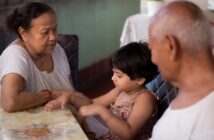1. Introduction
Navigating a mesothelioma diagnosis is emotionally demanding—not just for the patient, but for the entire family. The challenge intensifies when young children or grandchildren are involved. They process grief and fear differently, and without thoughtful guidance, they may feel confused, isolated, or even responsible. Open, age‑appropriate conversation helps maintain trust and emotional security. By tackling the topic sensitively, caregivers can foster resilience, honesty, and connection during a deeply unsettling time.
This article offers a comprehensive roadmap for caregivers, with practical strategies—from setting the tone in introductory talks to providing ongoing emotional support. Drawing from medical and psychological expertise, this guide ensures you deliver honest, calming, and hopeful messages tailored to your loved one’s age. Whether you’re preparing for that initial difficult conversation or seeking long‑term coping tools, this resource is designed to inform your approach every step of the way. Your family’s collective strength begins with clear, caring communication—and the healing power it can unlock.
2. Background & Context
Mesothelioma is a rare—and often aggressive—cancer caused by asbestos exposure, most commonly affecting the lungs (pleural mesothelioma) or abdomen (peritoneal mesothelioma) cancercare.org+2asbestos.com+2asbestos.com+2. With diagnosis often arriving decades after exposure, families can be blindsided emotionally and financially madeksholaw.com.
Children and grandchildren process news of illness uniquely. Studies on psychosocial needs underline that uncertainty, fear, and confusion are prevalent among young family members. A 2024 analysis even noted that “breaking the news to spouses/children” was one of the top concerns onlinelibrary.wiley.com+1cancercare.org+1.
Organizations such as the American Cancer Society, Cancer Care, and Mesothelioma-specific advocacy groups emphasize the importance of early, honest discussion using simple, transparent language. Key points include naming the disease, explaining where it affects the body, and outlining how life may change lanierlawfirm.com+6asbestos.com+6mesothelioma.com+6. Silence or euphemisms can foster fear and misconceptions; children need clarity to feel safe mesotheliomaguide.com+6mesotheliomasymptoms.com+6mesotheliomahope.com+6.
Understanding your loved one’s developmental stage is crucial. Young children need reassurance and straightforward truths, while older kids and teens often crave details and emotional validation . With this supporting context, the following sections explore communication strategies, emotional care, and resources to guide families through this journey.
3. Key Highlights from the Report
3.1 Timing and Transparency
- Tell them early: Experts recommend addressing the illness as soon as it’s known. Avoiding the topic may provoke anxiety and distrust mesotheliomasymptoms.com+1cancercare.org+1.
- Use accurate terms: Say “mesothelioma” or “cancer.” Avoid euphemisms like “sleeping” or “taking medicine”—these can be misleading mesotheliomahope.com.
3.2 Age-Appropriate Language
- Young kids: Brief, literal explanations—“Grandpa has cancer in his lungs and might be sick for a while” madeksholaw.com+6mesotheliomahope.com+6mesotheliomasymptoms.com+6.
- Pre‑teens/teens: More detail is appropriate. Discuss treatment effects, prognosis, and emotions cancercare.org+5mesotheliomahub.com+5lanierlawfirm.com+5.
3.3 Emotional Validation
- Normalize feelings: It’s okay to feel sad, angry, or scared asbestos.com.
- Encourage sharing: Let children express themselves honestly, verbally, creatively, or through play mesotheliomasymptoms.com+2mesotheliomahub.com+2mesotheliomahope.com+2.
3.4 Focus on Care and Support
- Reassurance: Clarify that no one can “catch” mesothelioma, and loved ones are in hand while Grandpa is treated or hospitalized lanierlawfirm.com+6asbestos.com+6mesotheliomasymptoms.com+6.
- Explain routines: Tell them about chores, caregiving, or changes coming—stability helps reduce anxiety cancercare.org+4mesotheliomahub.com+4mesotheliomahope.com+4.
3.5 Handling Conversations About Death
- Answer honestly: If asked, “Are you going to die?”, respond with age-appropriate sincerity: “Doctors are working hard… if things change, I promise to tell you.” asbestos.com.
- Avoid confusion: Don’t use euphemisms like “sleep”—children may develop fear around sleeping .
3.6 Ongoing Dialogue
- Keep the door open: Let kids know they can come back with questions anytime—some need time to process before asking lanierlawfirm.com+7mesotheliomahub.com+7mesotheliomasymptoms.com+7.
- Split conversations: Especially with teens, consider delivering information gradually to reduce overwhelm mesotheliomahub.com+1mesothelioma.com+1.
3.7 Supportive Resources
- Professional help: Oncology social workers, counselors, and peer support groups benefit both parents and children asbestos.com+5asbestos.com+5cancercare.org+5.
- Community tools: The Cancer Support Community and Cancer Care offer free programs just for children and families coping with cancer cancercare.org.
- Grief counseling: Children involved in the illness or loss often benefit from tailored grief therapy to express their emotions safely .
4. Deep Dive on Top Support “Vendors”
Here, “vendors” refers to trusted organizations, professionals, and peer networks that support families navigating mesothelioma with children.
4.1 Cancer Support Community
- Overview: A global non‑profit offering programs for adults and children affected by cancer cancer.gov+3mesotheliomasymptoms.com+3asbestos.com+3.
- Highlights:
- Toll-free helpline and online support (“Living Room”)
- Affiliate network with in-person counseling sessions
- Programs like Frankly Speaking About Cancer—including child‑centred guides
- Why it matters: Professional-led, multi-channel support reduces isolation and strengthens emotional coping skills.
4.2 Cancer Care®
- Overview: National organization providing oncology social workers, workshops, and family resources en.wikipedia.orgmesotheliomahope.com+2cancercare.org+2en.wikipedia.org+2.
- Key offerings:
- Booklet: Talking to Children When a Loved One Has Cancer
- Free counseling, web and phone-based workshops
- Resources supporting emotional expression and maintaining routine
- Why families choose it: Focused expertise in pediatric emotional needs and resilience-building.
4.3 Mesothelioma-Specific Services
- Asbestos.com: Detailed step-by-step guidance, age‑specific conversation tips (“keep it honest,” “explain symptoms”) mesotheliomahope.com+2cancercare.org+2mesotheliomasymptoms.com+2asbestos.com+2asbestos.com+2asbestos.com+2.
- Mesothelioma Hub / Mesothelioma Hope: Practical suggestions—e.g., “find a quiet place,” use simple language, reinforce that it’s not the child’s fault mesotheliomahub.com.
- What makes them unique: Tailored to mesothelioma’s challenges—rapid progression, emotional weight, prognosis honesty.
4.4 Mental Health Professionals (Counselors & Therapists)
- Role: Licensed counselors offer structured support:
- Individual therapy for grief or anxiety
- Family therapy to harmonize communication dynamics
- Group therapy for children: empowering shared expression
- When to engage: If children show persistent distress—such as withdrawal, behavioral shifts or panic—or caregivers feel overwhelmed emotionally.
4.5 Peer Support & Community Groups
- Local and online groups:
- Mesothelioma-focused boards, family cancer communities
- Facebook groups (e.g. “Cancer Caregivers – Life After Loss”) for shared advice mesotheliomahope.comasbestos.com
- Value to families: Reduces isolation, validates emotions, shares coping tools, and maintains long-term encouragement.
5. Strategic Takeaways for Caregivers
- Plan your messaging
- Choose a quiet, private moment. Prepare what you’ll say in advance onlinelibrary.wiley.com+5lanierlawfirm.com+5mesotheliomasymptoms.com+5.
- Use precise, age-appropriate language
- Say “cancer,” “mesothelioma,” “lungs.” Avoid euphemisms that may confuse or trigger fear mesotheliomahub.com+1mesotheliomahope.com+1.
- Normalize a full range of emotions
- Encourage children to express sadness, anger, or fear—model emotional honesty from the start .
- Reassure constant care
- Remind them they’re safe, cared for, and that no one can “catch” cancer asbestos.com.
- Anticipate tough questions
- Acknowledge uncertainty, like prognosis or death, with calm honesty… not false promises .
- Offer collaborative routines
- Invite children to help (e.g., simple chores) but balance it with normalcy and free time asbestos.com+7mesotheliomaguide.com+7mesotheliomahub.com+7mesotheliomasymptoms.com+1cancercare.org+1.
- Make support a long‑term commitment
- Keep the conversation open over time. Connect them with therapy or peer groups as needed cancer.gov+12mesotheliomahub.com+12madeksholaw.com+12en.wikipedia.org+1asbestos.com+1.
6. Future Outlook or Market Trends
- Growing emphasis on child‑centered oncology care: Research in 2024–25 highlights integrating psychological support for families into standard cancer treatment—ensuring early mental health screenings and child‑specific resources .
- Telehealth expansion: Virtual grief counseling and online family support groups have expanded significantly—making specialist care accessible, even in remote regions asbestos.com.
- Digital and multimedia tools: Expect more interactive e-books, apps, and video guides to help children process cancer in age-appropriate ways—and mesh with modern learning styles.
- Focus on family-wide resiliency: Healthcare systems and oncologists increasingly adopt whole-family care models—blending medical, emotional, and social support across lifespans.
- Policy & funding growth: Advocacy groups are pushing for insurance coverage of psychosocial services, including support for children of cancer patients—though more development is needed.
- Data-driven personalization: Emerging tools use AI and data analytics to match families with tailored resources—e.g., recommending local grief therapists, peer groups, or child support services based on need.
7. Conclusion + Call to Action (CTA)
Helping children and grandchildren navigate a loved one’s mesothelioma diagnosis is one of the most caring things families can do. Through honest dialogue, emotional reassurance, and access to expert support, you’ll guide young hearts toward understanding and resilience.
Call to Action:
- Initiate the conversation—choose a thoughtful moment, speak from the heart with simple, clear words.
- Seek help—connect with a licensed counselor or support group, like Cancer Care® or Cancer Support Community.
- Download helpful guides—resources like “Talking to Children When a Loved One Has Cancer” are excellent tools.
- Stay flexible—keep lines of communication open. Be there for the long haul.
By caring deeply now, you’re planting seeds of trust, emotional strength, and long-term healing. Take the first step: reach out today to a trusted professional or support network—and ensure your children feel seen, safe, and loved.



